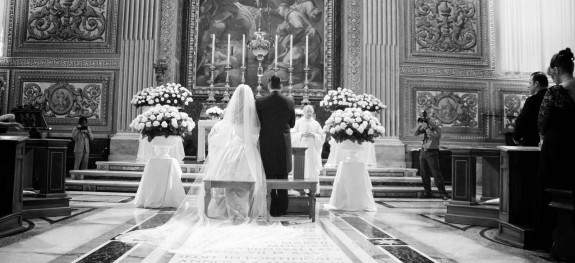Last year, my wife and I went out to dinner to celebrate our 27th wedding anniversary. The waitress seemed impressed. She asked us, “What’s your secret?”
I smiled and told her: “Patience.”
Then my wife chimed in: “And prayer.”
And now you know what it takes to be married to me. That explains why my wife says so many rosaries.
This Sunday, as we mark World Marriage Day, I think those two “P’s” – patience and prayer – are vital ingredients in marriage.
But if you look around, they are ingredients in short supply.
The statistics tell the story.
The divorce rate in America is nearly double what it was just 50 years ago. By one estimate, 40-50% of marriages will end in separation or divorce. Nearly one out of four children will experience divorce before they reach the age of 12.
No wonder so many couples are deciding to get married later—or just choosing to live together.
Last week, I read about a storage company in London called “Lovespace” that is doing a brisk business offering what it calls “break up protection.” If a couple is living together, the company will secretly store duplicate items—that extra microwave or wide screen TV—just in case things don’t work out. The other person never has to know.
That may be billed as “break up protection,” but the odds are not in their favor. Studies show that couples who live together are twice as likely to break up. Our culture has made it so easy.
And we have done it in a world that is so unsure, so fearful. Fearful of commitment, of permanence. Fearful of failure. We all want a sure thing.
Fear is part of our human condition.
But fear is not the way of love.
What do we hear again and again in scripture: “Do not be afraid.”
We cannot begin to love without first casting aside fear. That is true, especially, in marriage.
You want to make a marriage work?
Do not be afraid.
Be fearless. Love without limits.
And: prepare to be amazed.
Because marriage brings with it something we so often forget.
It brings us this sublime gift: the gift of grace. Marriage is a sacrament, and grace is part of the package.
It’s the grace of “all the days of my life,” those words in the marriage vows. It’s the grace of long nights at the kitchen table, sorting problems and paying bills. It’s the grace of comforting a sick child. It’s the grace of forgiving a hard word or a cruel look. It’s the grace of buying flowers for no particular reason, and holding a hand in the doctor’s office while waiting for the test results, and just being present to this other person in your life because sometimes the greatest present…is presence.
It’s the grace of “all the days of my life.”
Oh, love plays a big part. Yes. But love is unpredictable, and changeable. I give even more credit to grace—the sacramental gift flowing through marriage, binding you together through everything.
The gospel we heard a few minutes ago spoke of being salt and light. We are called to be that in the world – and that includes marriage, too.
We are called as husbands and wives to enrich one another like salt—and to bring one another light.
This winter, I think “salt and light” have other connotations too; it’s salt that gives traction on ice and keeps us from falling when we walk, and it’s light that shatters the gloom of these cold days and reassures us that spring will one day come.
That, too, is what marriage is about. Husbands and wives support one another and, like salt, keep one another from falling. And we give each other light in times of darkness, and offer hope in moments of despair.
And that, too, is grace.
Our theology tells us marriage is something sacred. It gives life—and it owes everything to the Giver of all life.
Periodically, people ask me to do a wedding at a catering hall or on a beach. And I tell them no, I can’t do that; the Church holds that marriages are to be blessed in a church. And people find that frustrating. Why?, they ask. Why do Catholics have to get married in church? Isn’t God everywhere?
Well, yes. He is. But God dwells, in a special way, here, in this tabernacle.
Here is the “source and summit” of our faith. But there’s another element, too.
When they come before the Church, and into a church, and bears witness and professes vows in this sacred setting, a couple performs a public act of humility, and faith, and belief.
They say: we don’t expect God to come to us. We are going to Him.
It is a deeper sign of how they are beginning their lives together, and it speaks to what will be important in their marriage.
If two Catholics grasp the commitment they are making, if they understand what is at stake, and believe in the faith into which they were baptized, why would they want to be married anywhere else?
Why would they not want the fullness of the sacrament, with all that entails?
Marriage is hard enough. Beginning it in the house of God can only help.
And it can only help to make us the salt and light Christ calls us to be in the gospel.
An organization that is working hard to do that is Worldwide Marriage Encounter, which is the driving force behind World Marriage Day. Almost 20 years ago, my wife and I took a weekend retreat with Worldwide Marriage Encounter. That experience is still bearing fruit. Some folks from Marriage Encounter will be in the back of the church after Mass. Stop by, say hello, talk to them about what the weekends are like.
If you do nothing else, just take home a prayer card for marriage. We often pray for vocations in this parish. This day, pray for the vocation of marriage.
Pray that those who feel called to this vocation will live it fearlessly.
Pray that they will live it joyfully.
Finally, pray that all of us called to marriage may live it faithfully—so we may be, by God’s grace, salt and light to the world.













